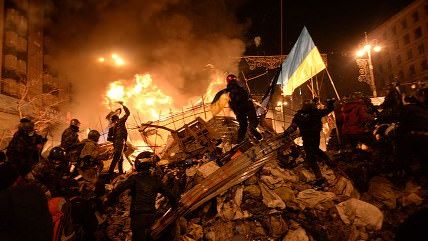Keep the US Out of Ukraine's Mess
It's about time American politicians saw how their foreign policies look to those on the receiving end.

President Obama insists he does not regard the conflict in Ukraine "as some Cold War chessboard in which we are in competition with Russia."
He'd be more credible if he were not following his predecessors in acting as though the Cold War still exists. Although the Soviet empire, including its Warsaw Pact alliance, disbanded beginning in 1989, Republican and Democratic presidents have pursued aggressively anti-Russian policies up to the present.
Most glaringly, NATO, the Western alliance created after World War II ostensibly to deter a Soviet invasion of Western Europe, did not also disband. On the contrary, at U.S. insistence and in violation of promises to Russia's leaders, the alliance has grown and found new missions, such as intervening militarily against Russia's ally Serbia and in Afghanistan and Libya.
That would have been bad enough, but former members of the Soviet bloc, as well as former Soviet republics, have been admitted to NATO: Albania, Bulgaria, Croatia, the Czech Republic, Estonia, Hungary, Latvia, Lithuania, Poland, Romania, Slovakia, and Slovenia. Besides that, U.S. officials have talked up two other former Soviet republics, Georgia and — surprise! — Ukraine, as potential members of the alliance.
Moreover, the U.S. government had a hand in the Georgian and Ukrainian "color revolutions," which brought pro-U.S. politicians to power, at least for a time. The Obama administration is still at it today.
The hostile push of NATO up to the doorstep of Russia (along with other threatening measures) has not gone unnoticed in Moscow. One can imagine the howls we'd hear from American politicians, not least of all the ever-belligerent Sen. John McCain, if Russia were doing something similar in the vicinity of the United States.
The sorry fact is that America's rulers did much more than spike the football when the Soviet Union peacefully disintegrated. In every conceivable way, they exploited the occasion to assure that the United States would maintain its status as sole superpower and global hegemon. They humiliated Russia's leadership, apparently not caring that it would never passively accept the insult.
It's about time American politicians saw how their foreign policies look to those on the receiving end.
What's happening in Ukraine is sad. The country is divided between those who want closer ties to Western Europe and those who want closer ties to Russia. Since becoming independent of Russia, Ukraine has suffered corruption and worse offenses at the hands of legal plunderers. Now demonstrations in the streets — even mob rule featuring neo-Nazis — have resulted in turmoil and death, and the Russia-leaning president, Viktor Yanukovich, has fled the capital, while the parliament has named an interim replacement. To make things worse, outsiders won't keep their hands off.
One thing we can know for sure — and one need not be an admirer of Russian president Vladimir Putin to see it — is that the United States should steer clear of Ukraine. It is none of the U.S. government's business whether that country is economically closer to Russia or the European Union (EU). The Obama administration should not only forswear direct and covert intervention, it should also shut up. American presidents must learn to mind their own business, even where Russia is concerned.
It would be best if Russia and the EU did not press agreements on Ukraine – Europe appears more guilty here than Putin – but that is not for the U.S. government to decide. Someday, if we're lucky, people will stop thinking of trade as a matter of state policy. Why must Ukraine — meaning its politicians — sign an agreement with either the EU or Russia? Why can't individual Ukrainians and private Ukrainian companies trade freely with whomever they want? (This question also applies to America and every other country.)
There are many sources of political tension in the world, but historically a principal one has been the idea that governments must set the terms of trade with people in other nations. Bad idea. Free trade should mean individual freedom.
In the meantime, the Obama administration should steer clear of Ukraine. Despite what Americans have believed for over 200 years, the United States was not placed on this earth to right the world. Intervention is more likely to make things worse than better.
This column originally appeared at the Future of Freedom Foundation.


Show Comments (50)